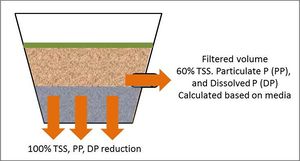
Difference between revisions of "Stormwater pollutant removal, stormwater credits"
m |
m |
||
| Line 19: | Line 19: | ||
**[http://stormwater.pca.state.mn.us/index.php/Calculating_credits_for_iron_enhanced_sand_filter Calculating credits for iron ehanced sand filter] | **[http://stormwater.pca.state.mn.us/index.php/Calculating_credits_for_iron_enhanced_sand_filter Calculating credits for iron ehanced sand filter] | ||
**[[Calculating credits for dry swale (grass swale)]] | **[[Calculating credits for dry swale (grass swale)]] | ||
| + | **[[https://stormwater.pca.state.mn.us/index.php?title=Calculating_credits_for_wet_swale_(wetland_channel)]] | ||
*[[Updates to credits and pollutant removal values]] | *[[Updates to credits and pollutant removal values]] | ||
Revision as of 16:36, 22 May 2018

Example schematic showing how pollutant load reductions are calculated for a bioretention basin with an underdrain. In this case, total volume, TSS and phosphorus credits are 100 percent for infiltrated water, while credits for filtered water (water captured by the underdrain) are 60 percent for TSS and are dependent on the media for phosphorus.
Credit refers to the stormwater runoff volume or pollutant reduction achieved toward meeting a runoff volume or water quality goal. Examples of goals include meeting the 1 inch volume reduction requirement in the Construction Stormwater General Permit and meeting TMDL pollutant reduction requirements. Credits can be achieved either by an individual BMP or cumulatively with multiple BMPs.
The following pages provide information on stormwater volume and pollutant credits, pollutant removal achieved by individual BMPs, methods for calculating volume and pollutant reductions (credits), and example calculations.
- Information on pollutant removal by BMPs
- Overview of stormwater credits
- Calculating stormwater volume and pollutant reductions and credits
- Credits for individual BMPs
- Calculating credits for bioretention
- Calculating credits for green roofs
- Calculating credits for infiltration basin
- Calculating credits for permeable pavement
- Calculating credits for tree trenches and tree boxes
- Calculating credits for stormwater ponds
- Calculating credits for stormwater wetlands
- Calculating credits for sand filter
- Calculating credits for iron ehanced sand filter
- Calculating credits for dry swale (grass swale)
- [[1]]
- Updates to credits and pollutant removal values